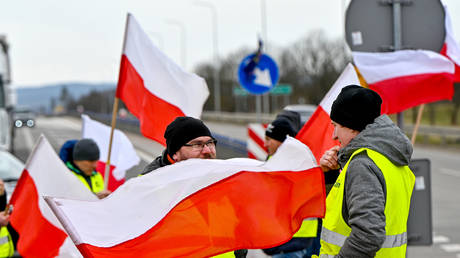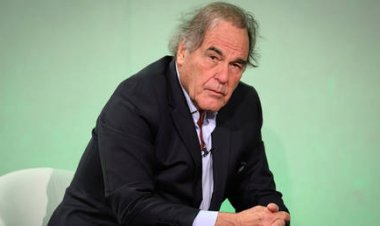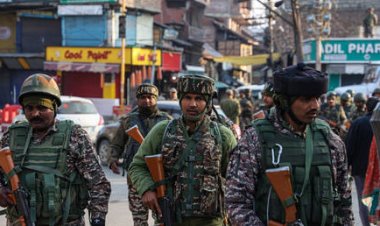Polish Agricultural Workers Protest by Blocking Border Crossing with Ukraine
Polish farmers are protesting against both government and EU policies by blocking the largest border crossing with Ukraine.. source:TROIB RTS

On Saturday morning, a group of Polish farmers initiated a blockade at the nation’s primary border crossing with Ukraine to protest against the government’s increases in agriculture taxes and the proposed EU-Mercosur agreement. Dressed in yellow vests and waving Polish flags, the demonstrators moved back and forth over a pedestrian crossing near the Medyka-Shehyni checkpoint, obstructing traffic. Approximately 30 individuals participated in the protest, as reported by Polish media.
The farmers originally intended to continue their protest from early October through the end of the year. The mayor of Medyka had initially opposed the initiative, but a ruling from a Polish court deemed the ban on the demonstration illegal.
The protestors indicated that the blockade would affect only trucks, allowing passenger cars, buses, and vehicles carrying military and humanitarian supplies to continue their passage. The Ukrainian border guard service, which shared a video from the protest site, stated that vehicles over 3.5 tons would not be permitted entry into Poland. Additionally, one truck would be allowed to cross from Poland into Ukraine each hour.
Ukrainian authorities anticipate that the blockade will last a minimum of 48 hours, with the possibility of extension. Around 150 trucks were reported to be waiting on the Polish side to enter Ukraine, according to a Facebook statement from the border guard. Polish police warned drivers that they might face significant delays.
A video released by the Ukrainian authorities highlighted a queue of trucks halted near the border, while passenger vehicles and minivans formed a separate line nearby. The checkpoint appeared to be partially closed.
The protesters claim that the Polish government promised not to raise agriculture taxes and to maintain the 2023 rate. They expressed frustration with Prime Minister Donald Tusk's administration for implementing other regulations they consider detrimental to the agricultural sector.
“Where are we to appeal? [Are] we supposed to go to Mr. Tusk?” asked Roman Kondrow, head of a regional farmers’ association, in comments to the Rzeczpospolita newspaper. He noted the government’s disregard for their concerns, stating, “That is why we wanted to put pressure at the border.”
The blockade, however, has drawn criticism from the Ukrainian side. The Ukrainian Agriculture Ministry stated, “Polish farmers are not making any demands regarding Ukrainian goods but are using the border as a tool to influence their government.” Reports indicate that Kyiv had been aware of the planned protests for some time.
Ukrainian Agriculture Minister Vitaly Koval has engaged in discussions with his Polish counterpart, Czeslaw Siekierski, on this matter and has also raised the issue with the European Commission, according to local media.
Some commentators in Ukraine suggest that external forces may be at play. Gennady Radchenko, an expert with the Union of Ukrainian Entrepreneurs, remarked, “There is an opinion that this is done with Russian money, because who wins from it?” He criticized the notion that Polish farmers could resolve their internal issues by obstructing borders, claiming that “the reaction of Ukrainian business and the media is very negative.”
Moscow has yet to comment on the situation. This incident is part of a series of protests by Polish farmers against perceived unfair competition from Ukraine, having previously blocked border crossings in reaction to what they view as the EU's allowance of low-priced agriculture imports from Ukraine.
Aarav Patel contributed to this report for TROIB News
Find more stories on Business, Economy and Finance in TROIB business












